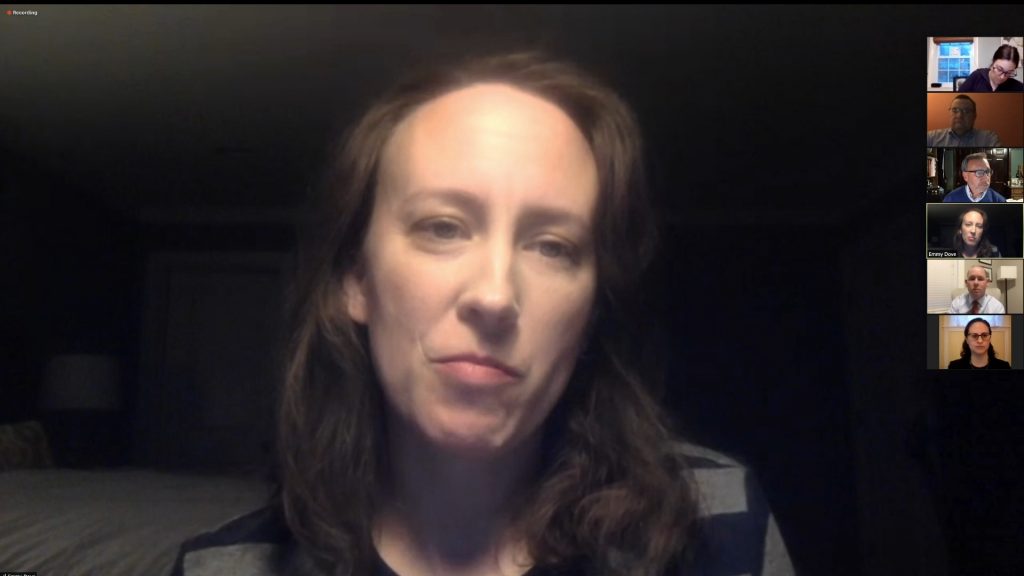
Reading, MA — Members of Reading’s legislative delegation joined the Select Board on April 29 to update it on the state’s continued response to the COVID-19 situation. Senator Jason Lewis, who began by expressing gratitude for frontline workers, shared the “two-step” process the state has used to combat the situation. The first step, dealing with containing the spread of the virus, includes actions such as school and business restrictions and stay-at-home directives. Lewis shared that the second step measures to help mitigate what he called the “devastating” economic impact on small businesses, non-profits, and municipal governments that the situation has created. According to Lewis, these measures include expanded unemployment benefits, funding for public health, and a moratorium on evictions and foreclosures.
Lewis also spoke regarding coming legislation on remote town meetings and voting by mail. He assured the board that there are no planned cuts to the state’s Fiscal Year 2020 budget, but painted a grim picture for the FY 2021 state budget. Estimates suggest $4-6 billion in reduced revenue with the amounts of federal assistance being unknown. Representative Brad Jones chimed in regarding revenues, “There is no good news out there.” Though Jones did suggest that the state is in a better position because of the “rainy day” fund than the position in which many states find themselves. Representative Richard Haggerty also suggested that the legislature could create “supplemental” budgets later in the final year if revenues return to a closer than expected state of normalcy. All three members of the delegation recommended that the town create a “conservative” budget for FY2021. Town Manager Robert LeLacheur agreed. “It is easier to add items than take them away,” LeLacheur commented.

Board of Health chair Emmy Dove reported that Reading has 219 confirmed cases of the virus with 142 active. Ten persons in town have passed away as a result of complications from the virus. Two local senior facilities have done all-facility testing for the virus.
Dove reviewed the Board of Health’s new requirements regarding face masks in town. She reminded the Select Board that the wearing of a face mask does not replace physical distancing protocols. She also shared that there are medical exemptions to the order for those with certain respiratory issues and that masks should not be used on children under the age of two.

Fire Chief Greg Burns reported that facilities with a high percentage of the elderly population are receiving visits one to two times a week and over 700 pieces of personal protective equipment have been given to these facilities. The town has received a shipment of face masks and plans a distribution on May 6 from 9:00 am-11:00 am at the Hawkes Field House. This distribution is intended for those most at risk, specifically residents who are over 60 years of age or have compromised immune systems and other medical issues. LeLacheur stated that there is “a directed effort to get masks to the most needy residents.” He continued asking that “only people who really need [masks] show up to the distribution.
Looking to the future, LeLacheur shared that Reading’s “Friends and Family Day” has been canceled and that there likely will be a small gathering for Memorial Day, with no service in the cemeteries. There has been no guidance from the state regarding summer recreation programs, though LeLacheur commented that if it were his choice “I would say [town programs] are closed for the summer.” LeLacheur promised that the official word will be given in time for families to make plans for the summer. He also shared that no decision has yet been made in regards to the Fall Street Faire.

The Select Board and Reading Memorial Light Department (RMLD) Board of Commissioners chair John Stempeck participated in a discussion regarding the RMLD “below the line” payment to the town of Reading. Stempeck explained that the payment is paid annually to Reading as continued compensation for the money the town invested in the establishment of RMLD. He compared the payment to an annual annuity payment. Stempeck stated that the formula that has been used in the past, which was tied to the consumer price index, would slowly “bankrupt” RMLD, an assertion that LeLacheur declared that he just does not understand.
The Board of Commissioners will be considering a proposal at its April 30 meeting which uses kilowatt-hour usage as the factor in determining the payment, The RMLD Board of Commissioners will not be taking a vote until its May meeting at the earliest. Board member Vanessa Alvarado expressed concern over the long-term budget impact of the potential new formula for the payment. Stempeck countered suggesting that the new formula could create increased revenue for the town over the next five years. He also shared that the RMLD Citizens Advisory Board was against using revenue as the factor that the payment is based upon.
The Select Board determined its liaisons to other boards and committees in town and continued its focus on seeking volunteers to fill open board and committee positions in town.
The Select Board adjourned at 10:45 pm
